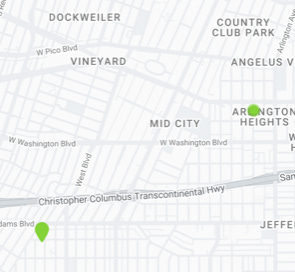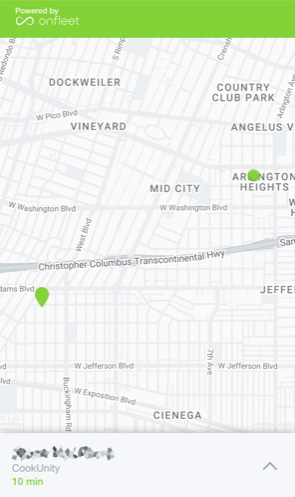Don’t miss the 3rd annual dot.LA Summit on October 20-21 at the Petersen Museum!
The dot.LA Summit brings together hundreds of the top founders, investors and operators across the L.A. tech and startup ecosystem for an unrivaled program aimed at strengthening the community and addressing the most urgent issues of the day.
The Summit includes an opening night VIP reception as well as a full day of exciting programming, panels, pitch competition, awards show, relationship building and more!
Join us for the largest celebration of the LA tech and startup ecosystem! The Summit convenes LA's top founders, investors, and operators for panels, workshops, a pitch competition, and the annual dot.LA Awards.
Register now using our exclusive code: CURBIVORE100
For more info about the Summit visit: dotlasummit.com or send any questions regarding this event to summit@dot.la
Exploring the Logistics of Meal Delivery Startup CookUnity
Let’s say it’s Friday night, and there’s a hot new chef whose cuisine you’d like to try. Maybe you make a reservation at their restaurant, or maybe you get a few items delivered by your favorite app. But what if this restaurant is in a different city? If they’re a well-established name, it’s possible they’ll have a few frozen options on Goldbelly, or maybe they’ll bless your town with a pop-up collaboration for a few nights.
Still, the odds are low that you’ll get to try an up and coming chef if you don’t happen to score a coveted reservation. That’s the problem that CookUnity, founded in 2016, is working to solve. And after trying their delivered meals for a week, I can say I’m a believer!
This isn’t a food review site, so while I can attest that Stacy Bareng’s Tofu & Mushroom Sisig and Deau Arpapornnopparat’s Tamarind Grilled Steelhead Trout were delicious, what’s particularly impressive (and dare I say… relevant to this audience) is the logistics of a company that’s working to get meals created by chefs across the country to a doorstep near you.
CookUnity has set up commercial kitchens across the country, with at least one in each major market it serves like LA, SF, NYC, and DC. But bourgeoning gourmands in remote West Texas or deep in the Ozarks need not fear, as even rural customers can get a CookUnity soft cooler shipped to them from a nearby city.
But it’s the cold chain in CU’s core cities we’ll be analyzing today, which starts back at each commercial kitchen, which is in operation almost every day of the week. Chefs whip up dishes in sized batches, delivered fully composed, not Blue Apron style DIY. Customers can decide each week how many meals (4, 6, 8, 12, or 16) they’d like to receive, dropped off in a soft cooler that’s returned to the company the following week.
While CookUnity maintains a sizable supply chain and fulfillment team in-house (including some at the company’s Buenos Aires back office,) the actual dispatching is handled via Onfleet. The delivery workers themselves are third party drivers; I believe I spied my trial meals being dropped off from a silver Prius that was filled to the brim with other branded bags.
Chatting with CookUnity’s Los Angeles Market Director Zach Ritchken, he added, “With cooking and delivering prepared food, obviously you have to have an airtight temperature control process. We have built out our own middle and last-mile logistics network to serve as many eaters as possible via courier, or ‘local’ drivers.”
All in all, it’s an impressive logistics machine that ensures 200 unique menu options can make it to a dining table near you. And as long as you’re competent enough to turn your oven on, you can feel like you’re in the kitchen alongside Ludo Lefebvre or Jose Garces.
HOT INDUSTRY NEWS & GOSSIP
New DOL gig regs - much ado about nothing? The Labor Department dropped some new worker classification guidance earlier this week, and the Twitterverse went into an awfully strong tizzy for something that’s still in the proposal stage, and is later sure to be buffeted by litigation for years to come (who else remembers the SuperShuttle decision, preceded by the Fedex decision, preceded by the earlier Fedex decision…)
It appears the market has walked back its initial surprise, as most gig-powered companies have pared back their initial stock drops, on a week that’s seen the overall stock market gently decline. Still, should the guidance hold, it could update the test that’s generally used to determine if someone is a contractor or employee, restoring a multi-factor emphasis, whereas the previous administration had given extra weight to two particular questions: how much control does a worker have over their work — can they set their own schedule, work for multiple employers, and reject certain projects? And, how great is a worker’s opportunity for profit or loss based on their own initiative or investment?
Should the new rules survive, we’re likely to see delivery and TNC firms respond both with more state-level campaigning, as well as adding additional flexibility to how workers can engage with their apps. That said, there could be a bigger impact on apps where workers don’t multi-home. If you spend 40 hours a week picking, packing, driving, or (but not and) delivering - it might just be a bit harder to argue you’re not an employee…
Getir gets a gorilla? A super-fast merger may be in the works, with Getir in advanced talks to buy rival Gorillas. That hasn’t stopped the latter deliverer from making real estate moves, as it starts opening regional warehouses to power its neighborhood hubs that dot the map of each market.
Nobody said making EVs was easy… Rivian recalls every vehicle its ever made, albeit for a quick fix to a loose fastener. While this might mean temporarily fewer R1S and R1T SUVs and pickups on the road, the real numerical impact is on its delivery van platform.
Get Mike’s money! Bloomberg Philanthropies announced a few new curb-centric initiatives. One offers up to $1 million per city for 10 municipalities to build out new cycling infrastructure. Another, specific to Europe, will paint traffic-calming murals across the asphalt of 19 cities.
Other curb improvements… NYC’s Meatpacking district is planning a pedestrian “oasis” on its still industrial looking riverfront blocks. On the opposite coast, Culver City voted to abolish parking minimums, and started the process of converting an underused street into new park space.
Grocer v Grocer: Grocery giant Kroger is in talks to gobble up rival Albertsons. For cities, this could mean a lot more empty big-boxes, as the consolidated company would look to close duplicate locations. It could also set off another scramble among grocery delivery networks, some of which already seem to be struggling with slowing growth.
Good gREEF! Ghost kitchens on a truck are turning out to be a tougher business than some thought, as Burger King, Popeyes, Jack in the Box, and Del Taco are reported to have ended their partnerships with REEF Technologies.
New CRO served up… Serve Robotics announces a new Chief Revenue Officer: Prahar Shah, who previously served at DoorDash.
Bird takes a bath: The once high-flying scooter company has now seen almost all of its C-suite depart. Adding insult to injury, founder Travis VanderZanden has offloaded his prized Miami property, which notably has no sidewalks nearby…
Luscious links: Swiftmile, Vector and Tranzito team up. Bus ridership has bounced back, but train travel hasn’t (missing from this article is the impact of poverty on ridership choices.) Amazon giving up on its delivery bot biz? Miovision acquires Rapid Flow. Exxon workers quitting en masse; how many more until the pumps shut off? City finances looking surprisingly strong. Self driving cars looking not so strong. EatStreet’s dark kitchen brand HungerHub ghosts Wisconsin. Startups raising up rounds in name only; this seems particularly true for some recent delivery and mobility raises. Artist fashions faux automobile to highlight the absurdity of on street parking rules.
And did you see we sent out save the dates for the next Curbivore conference? See you 3/3/23!
- Jonah Bliss & The Curbivore Crew







